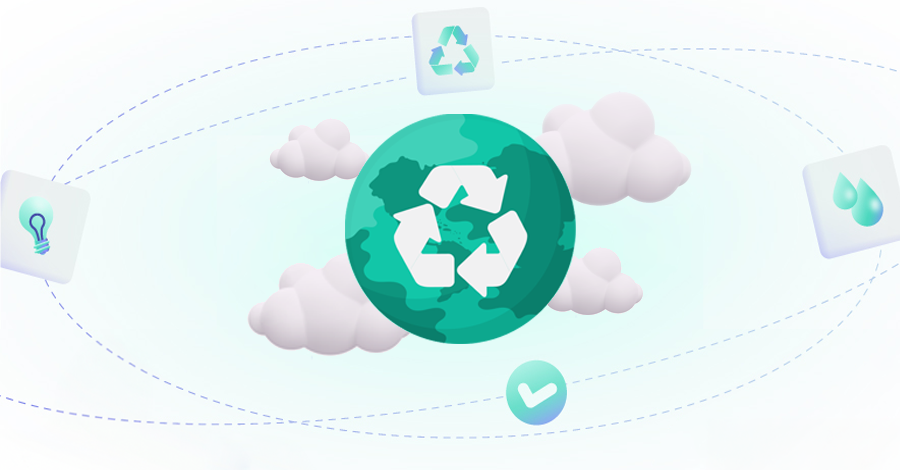Organizations across the secured finance industry are evaluating their approaches to Environmental, Social, and Governance (ESG) practices in their organizations. The term ESG was first coined by a UN report in 2004 titled “Who Cares Wins”, and since then has grown in significance, accelerating its importance over the last few years.
An unsustainable supply chain is becoming increasingly costly. Environmental risks mean that by 2026, the impact is expected to cost $1.26 trillion. Recognizing the potential future risk, the EU Commission introduced the Green Deal in December 2019. This promotes a shift towards a circular economy, where the life cycle of products is stretched through recycling, reusing, leasing, and so on, in order to limit waste as far as possible and extract more value out of the products we make.
This deal isn’t just positive from an environmental perspective. It also cultivates more competition in the lending industry, advancing economic growth, and it is expected that by 2030, a circular economy could stimulate over 700,000 new jobs in the EU. If this deal is successful, consumers will be saving money as more durable products last longer, whilst boosting profits for businesses, resulting in a “win-win” scenario. The circular economy is key to delivering on ESG goals, providing the opportunity to recognize risks and encourage growth in every organization.
Environmental considerations
In order to understand how we have an impact on the environment, there are three categories (known as scopes) to help us recognize what parts of our operations we need to focus on.
These three scopes are:
- Scope 1: These are all emissions that organizations cause directly. Company vehicles, for example, would fall under scope 1.
- Scope 2: Emissions that organizations cause indirectly through the energy that they purchase and use, such as heating the office.
- Scope 3: Emissions that are not caused by the organizations themselves but are directly responsible for in the value chain, both upstream and downstream.
Within scope 3, there are multiple sub-categories. The one that is most relevant in the leasing industry is category 15: investments.
One way that lenders are tackling the environmental side of ESG is through green loans. These loans aim to address the environmental impact that secured lenders are responsible for by financing green projects that provide clear environmental benefits, whether it be direct to personal customers, such as a loan for an electric vehicle, or for companies to invest in greener buildings.
Social, and Governance considerations
PwC found that 76% of consumers would no longer use a brand if they treat employees, communities, and the environment poorly. It is important that you tackle not only the environmental impact your business has but also the impact on those working in your company and the wider community.
One way that lenders consider society is through social loans. These loans aim to support economic activity which mitigates social issues or achieves positive social outcomes. As a secured finance lender, an example of this could be financing infrastructure that is needed in society, such as transport, telecommunications, or sanitation.
The G element – governance – is often overlooked when deciding on an ESG strategy. However, the importance of concentrating on how your business is governed should not be understated. It is relevant to companies across every industry; business ethics, corporate structure, and supply chain management are just a few examples. Decision-making in the corporate world should reflect societal values, and businesses with strong governance policies are more trustworthy, valuable, and in the best position to succeed.
ESG challenges
Some lenders shy away from an ESG strategy as they worry that there’s a lack of return on investment. However, a study by McKinsey proves that ESG actually creates value for your business. According to the study, it facilitates top-line growth, reduces costs, minimizes regulatory risk, increases employee productivity, and optimizes investment and capital expenditures. As previously mentioned, many consumers are looking to work with businesses that make a conscious effort to address ESG, so you could be missing out on significant business opportunities if you are not prepared.
An ESG strategy should not just be a tick-box exercise either. “Greenwashing” is the practice in advertising where an organization markets itself or its products as helping the environment when what they are doing is purely for marketing purposes and has little to no impact. The Advertising Standards Agency (ASA) in the United Kingdom is cracking down on companies that “greenwash” if they feel that they are misleading customers to believe that the company is making a positive impact, when in fact it is just one or two initiatives to use as advertising. The strategy your organization deploys needs to be comprehensive and focused on genuinely making a difference to the wider society. It should not be about the profit you can make, but the value your business can bring, which benefits both you and others.
Overall, if ESG isn’t a core consideration in your business strategy, now is the time to change this. Adapting your business strategy to meet changing ESG recommendations requires flexibility – Solifi Open Finance Platform is scalable, flexible, and features automated upgrades to access new features and capabilities. With the right technology, you can ensure your business is always reactive to changing ESG recommendations.
